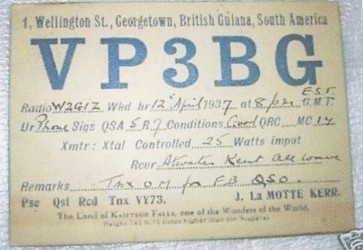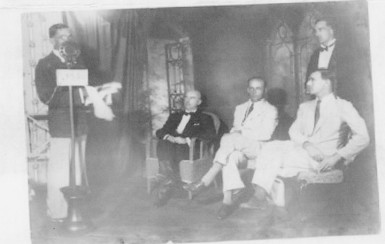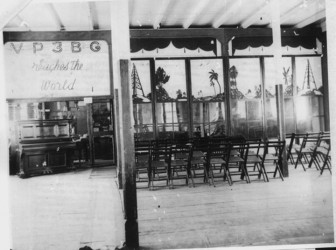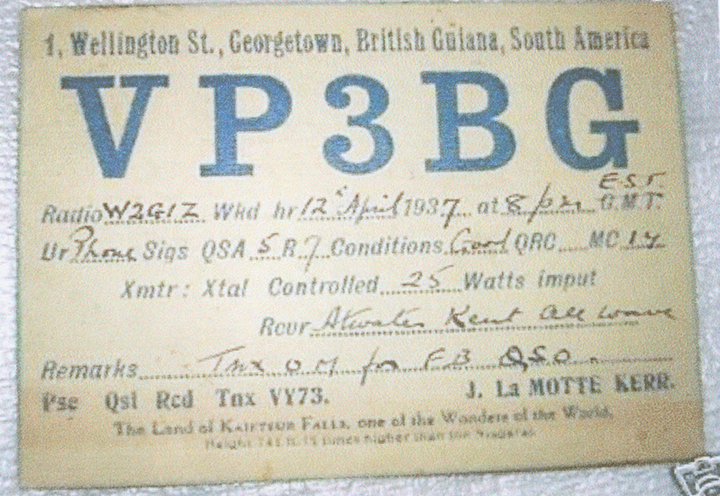Dear Editor,
I have been casually following your newspaper for some time now. The papers of my day were The Daily Chronicle and The Argosy bearing in mind that I was born in Regent Street, Bourda in December of 1929 and left in March of 1943. I visited 164 Waterloo Street many times (before it became government offices) and I knew Ted and Bunny, Suukie and Indrani along with J A and his beautiful wife.
I recently re-read two posts on VP3BG (2010 and 2014) and decided to contact you. My family’s recorded history in then British Guiana began in 1836 and beyond, (recorded history, that is) when my mother’s grandfather, Ben V Abraham arrived in your fair city. His story and that of one of his sons are part and parcel of the country’s story as can be found in the English archives in London. Ben V wrote a rather long report for the Historical Society entitled ‘The History of Gold Mining in British Guiana.’
 VP3BG was the ‘call’ of Louis Kerr’s amateur radio until it was transferred in 1934. It was also known as The Voice of Guyana, The Voice of Demerara, The Voice of British South America and some other complimentary names.
VP3BG was the ‘call’ of Louis Kerr’s amateur radio until it was transferred in 1934. It was also known as The Voice of Guyana, The Voice of Demerara, The Voice of British South America and some other complimentary names.
The Anglican Bishop of Guyana and Barbados broadcast his Christmas greetings from its studio; The Hindu Hour with Dr Singh was also heard from there. I would say that these were among the first ecumenical broadcasts anywhere. One open programme had a background of ‘Come to the Church in the Wildwood.’ The comings and goings as well as the Death Announcements were broadcast at noon every day. (People with battery radios brought down the fury of a Scottish battalion in BG at that time. They responded by bringing in a ‘wired’ broadcaster from the UK and organized VP3MG. They bought out the limited company of ZFY and forced my father out. Somewhere in there was a libel judgement which was not discussed. He went to Trinidad, hoping to satisfy the thirst there for a broadcast station, but was stymied by the same people who provided wired services.)
He did what he did best and went into business. He was one of the first non-Brits to manage a bookstore in Georgetown in 1917.
I have also noted many articles listed as being on VP3BG but which list VP3MR as the lead radio station. Forgive me, but VP3BG was there first, check it out. And while doing that check out find out why ‘MR’ had to be amalgamated with ‘BG’ giving up its studio and transmitters. We all can guess why BG was chosen as the name, but as for MR, who can tell the connection to the then colony and its people – although I can. Ah, table talk.

 Re M S S Rowe’s letter, it is interesting and fills in a lot of gaps. I remember him and have visited his workshop where I saw many, many Guyanese being instructed in the techniques of radio repair, a craft that was not available elsewhere, especially for locals. James L Kerr who owned the licence for VP3BG was a professional photographer whom I knew as Louis Kerr.
Re M S S Rowe’s letter, it is interesting and fills in a lot of gaps. I remember him and have visited his workshop where I saw many, many Guyanese being instructed in the techniques of radio repair, a craft that was not available elsewhere, especially for locals. James L Kerr who owned the licence for VP3BG was a professional photographer whom I knew as Louis Kerr.
One should remember that AM radio was invented and patented in 1901 by a young man who was born in Quebec, Canada and pursued his dreams while travelling and working for various companies. His name was Reginald Fissenden. Another important name was Fred Hammond who with his brothers built the first transformers used to enable household radios to function without batteries. Fred himself helped promote amateur and small commercial radio stations throughout the world. I am certain that I saw Hammond transformers and chokes in the equipment at BG. I came to know Fred and his company from doing business with them.
Yours faithfully,
Louis C Kellman
Canada





